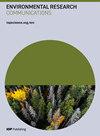Research on the impact of environmental regulations on green technological innovation in China from the perspective of digital transformation: a threshold model approach
IF 2.9
4区 环境科学与生态学
Q3 ENVIRONMENTAL SCIENCES
引用次数: 0
Abstract
The digital transformation in developing countries is crucial in determining whether environmental regulations can better facilitate green technological innovation. This paper constructs a theoretical model to deduce the relationships among digital transformation, environmental regulations, and green technological innovation. Empirical research is conducted using a two-way fixed-effects model and a threshold regression approach, based on provincial panel data from China spanning the years 2013 to 2020. The results indicate that environmental regulation inhibits green technological innovation. However, digital transformation, by reducing cost pathways, can promote the efficiency of green technological innovation under environmental regulation. This moderating effect exhibits a nonlinear threshold characteristic. Regarding dimensions of digital transformation, the level of digital investment shows no threshold, while both the level of digital application and the scale of digital integration exhibit threshold effects. Presently, in China, digital transformation effectively incentivizes green technological innovation under environmental regulation. Therefore, increasing digital investment, advancing digital applications, and fostering digital integration are inevitable choices to drive green technological innovation under the pressure of environmental regulation.数字化转型视角下环境法规对中国绿色技术创新的影响研究:一种门槛模型方法
发展中国家的数字化转型对于环境法规能否更好地促进绿色技术创新至关重要。本文构建了一个理论模型,以推导数字化转型、环境规制和绿色技术创新之间的关系。基于中国 2013 年至 2020 年的省级面板数据,采用双向固定效应模型和阈值回归方法进行了实证研究。研究结果表明,环境监管抑制了绿色技术创新。然而,数字化转型通过降低成本途径,可以促进环境规制下绿色技术创新的效率。这种调节效应呈现出非线性阈值特征。在数字化转型的维度上,数字化投资水平没有门槛,而数字化应用水平和数字化集成规模都表现出门槛效应。目前,在中国,数字化转型有效激励了环境监管下的绿色技术创新。因此,加大数字化投入、推进数字化应用、促进数字化融合是环境监管压力下推动绿色技术创新的必然选择。
本文章由计算机程序翻译,如有差异,请以英文原文为准。
求助全文
约1分钟内获得全文
求助全文

 求助内容:
求助内容: 应助结果提醒方式:
应助结果提醒方式:


